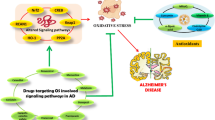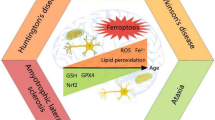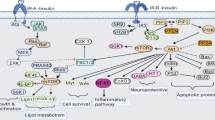Abstract
Neurodegenerative diseases and postoperative cognitive dysfunction involve the accumulation of β-amyloid peptide (Aβ). High glucose can inhibit autophagy, which facilitates intracellular Aβ clearance. The α2-adrenoreceptor agonist dexmedetomidine (DEX) can provide neuroprotection against several neurological diseases; however, the mechanism remains unclear. This study investigated whether DEX regulated autophagy via the AMPK/mTOR pathway to improve high glucose-induced neurotoxicity in SH-SY5Y/APP695 cells. SH-SY5Y/APP695 cells were cultured with high glucose with/without DEX. To examine the role of autophagy, the autophagy activator rapamycin (RAPA) and autophagy inhibitor 3-methyladenine (3-MA) were used. The selective AMPK inhibitor compound C was used to investigate the involvement of the AMPK pathway. Cell viability and apoptosis were examined by CCK-8 and annexin V-FITC/PI flow cytometric assays, respectively. Autophagy was analyzed by monodansylcadaverine staining of autophagic vacuoles. Autophagy- and apoptosis-related protein expression and the phosphorylation levels of AMPK/mTOR pathway molecules were quantified by western blotting. DEX pretreatment significantly suppressed high glucose-induced neurotoxicity in SH-SY5Y/APP695 cells, as evidenced by the enhanced viability, restoration of cellular morphology, and reduction in apoptotic cells. Furthermore, RAPA had a protective effect similar to that of DEX, but 3-MA eliminated the protective effect of DEX by promoting mTOR activation. Moreover, the AMPK/mTOR pathway was involved in DEX-mediated autophagy. Compound C significantly suppressed autophagy and reversed the protective effect of DEX against high glucose in SH-SY5Y/APP695 cells. Our findings demonstrated that DEX protected SH-SY5Y/APP695 cells against high glucose-induced neurotoxicity by upregulating autophagy through the AMPK/mTOR pathway, suggesting a role of DEX in treating POCD in diabetic patients.






Similar content being viewed by others
Data Availability
The datasets used or analyzed during the current study are available from the corresponding author on reasonable request.
References
Alvarez-Almazan, S., Filisola-Villasenor, J. G., Aleman-Gonzalez-Duhart, D., Tamay-Cach, F., & Mendieta-Wejebe, J. E. (2020). Current molecular aspects in the development and treatment of diabetes [J]. Journal of Physiology and Biochemistry, 76(1), 13–35. https://doi.org/10.1007/s13105-019-00717-0
Arrozi, A. P., Shukri, S. N. S., Ngah, W. Z. W., Yusof, Y. A. M., & Makpol, S. J. S. R. (2020). Comparative effects of alpha- and gamma-tocopherol on mitochondrial functions in Alzheimer’s disease in vitro model [J]. Scientific Reports, 10(1), 8962. https://doi.org/10.1038/s41598-020-65570-4
Cai, Z. Y., Yang, B., Shi, Y. X., Zhang, W. L., Liu, F., Zhao, W., & Yang, M. W. (2018). High glucose downregulates the effects of autophagy on osteoclastogenesis via the AMPK/mTOR/ULK1 pathway [J]. Biochemical and Biophysical Research Communications, 503(2), 428–435. https://doi.org/10.1016/j.bbrc.2018.04.052
Chandrasekaran, K., Choi, J., Arvas, M. I., Salimian, M., Singh, S., Xu, S., Gullapalli, R. P., Kristian, T., & Russell, J. W. (2020). Nicotinamide mononucleotide administration prevents experimental diabetes-induced cognitive impairment and loss of hippocampal neurons [J]. International Journal of Molecular Sciences. https://doi.org/10.3390/ijms21113756
Chen, H., Ji, Y., Yan, X., Su, G., Chen, L., & Xiao, J. (2018). Berberine attenuates apoptosis in rat retinal Müller cells stimulated with high glucose via enhancing autophagy and the AMPK/mTOR signaling [J]. Biomedicine & Pharmacotherapy, 108, 1201–1207. https://doi.org/10.1016/j.biopha.2018.09.140
Chen, M., Huang, N., Liu, J., Huang, J., Shi, J., & Jin, F. (2021). AMPK: A bridge between diabetes mellitus and Alzheimer’s disease [J]. Behav Brain Res, 400, 113043. https://doi.org/10.1016/j.bbr.2020.113043
Chen, X. H., Chen, D. T., Huang, X. M., Chen, Y. H., Pan, J. H., Zheng, X. C., & Zeng, W. A. (2019). Dexmedetomidine protects against chemical hypoxia-induced neurotoxicity in differentiated PC12 cells via inhibition of NADPH oxidase 2-mediated oxidative stress [J]. Neurotoxicity Research, 35(1), 139–149. https://doi.org/10.1007/s12640-018-9938-7
Chen, X. H., Zhou, X., Yang, X. Y., Zhou, Z. B., Lu, D. H., Tang, Y., Ling, Z. M., Zhou, L. H., & Feng, X. (2016). Propofol protects against H2O2-induced oxidative injury in differentiated PC12 cells via inhibition of Ca(2+)-dependent NADPH oxidase [J]. Cellular and Molecular Neurobiology, 36(4), 541–551. https://doi.org/10.1007/s10571-015-0235-1
Cheng, A., Lu, Y., Huang, Q., & Zuo, Z. (2019). Attenuating oxygen-glucose deprivation-caused autophagosome accumulation may be involved in sevoflurane postconditioning-induced protection in human neuron-like cells [J]. European Journal of Pharmacology, 849, 84–95. https://doi.org/10.1016/j.ejphar.2019.01.051
Feinkohl, I., Winterer, G., & Pischon, T. (2017). Diabetes is associated with risk of postoperative cognitive dysfunction: A meta-analysis [J]. Diabetes/Metabolism Research and Reviews. https://doi.org/10.1002/dmrr.2884
Feinkohl, I., Winterer, G., & Pischon, T. (2017). Hypertension and risk of post-operative cognitive dysfunction (POCD): A systematic review and meta-analysis. Clinical Practice and Epidemiology in Mental Health: CP & EMH, 13, 27. https://doi.org/10.2174/1745017901713010027
Hou, X., Xu, F., Zhang, C., Shuai, J., Huang, Z., Liang, Y., & Xu, X. (2020). Dexmedetomidine exerts neuroprotective effects during high glucose-induced neural injury by inhibiting miR-125b [J]. Bioscience Reports. https://doi.org/10.1042/BSR20200394
Hou, X., Xu, F., Zhang, C., Shuai, J., Huang, Z., Liang, Y., & Xu, X. (2020). Dexmedetomidine exerts neuroprotective effects during high glucose-induced neural injury by inhibiting miR-125b [J]. Bioscience Reports. https://doi.org/10.1042/BSR20200394
Kho, W., von Haefen, C., Paeschke, N., Nasser, F., Endesfelder, S., Sifringer, M., González-López, A., Lanzke, N., & Spies, C. D. (2021). Dexmedetomidine restores autophagic flux, modulates associated microRNAs and the cholinergic anti-inflammatory pathway upon LPS-treatment in rats [J]. Journal of Neuroimmune Pharmacology. https://doi.org/10.1007/s11481-021-10003-w
Kleiman, A. M., & Johnson, K. B. (2019). Untapped potential of dexmedetomidine [J]. Anesthesia and Analgesia, 129(6), 1450–1453. https://doi.org/10.1213/ANE.0000000000004411
Kuruva, C., Manczak, M., Yin, X., Ogunmokun, G., Reddy, A., & Reddy, P. J. H. (2017). Aqua-soluble DDQ reduces the levels of Drp1 and Aβ and inhibits abnormal interactions between Aβ and Drp1 and protects Alzheimer’s disease neurons from Aβ- and Drp1-induced mitochondrial and synaptic toxicities [J]. Human molecular genetics, 26(17), 3375–95. https://doi.org/10.1093/hmg/ddx226
Li, C. J., Wang, B. J., Mu, D. L., Hu, J., Guo, C., Li, X. Y., Ma, D., & Wang, D. X. (2020). Randomized clinical trial of intraoperative dexmedetomidine to prevent delirium in the elderly undergoing major non-cardiac surgery [J]. British Journal of Surgery, 107(2), e123–e132. https://doi.org/10.1002/bjs.11354
Li, L., Ye, X. P., Lu, A. Z., Zhou, S. Q., Liu, H., Liu, Z. J., Jiang, S., & Xu, S. Y. (2013). Hyperglycemia magnifies bupivacaine-induced cell apoptosis triggered by mitochondria dysfunction and endoplasmic reticulum stress [J]. Journal of Neuroscience Research, 91(6), 786–798. https://doi.org/10.1002/jnr.23216
Liu, J., Su, H., & Qu, Q. M. (2016). Carnosic acid prevents beta-amyloid-induced injury in human neuroblastoma SH-SY5Y cells via the induction of autophagy [J]. Neurochemical Research, 41(9), 2311–2323. https://doi.org/10.1007/s11064-016-1945-6
Miao, Y., Guo, D., Li, W., & Zhong, Y. (2019). Diabetes promotes development of Alzheimer’s disease through suppression of autophagy [J]. Journal of Alzheimer’s Disease, 69(1), 289–296. https://doi.org/10.3233/JAD-190156
Nie, S. D., Li, X., Tang, C. E., Min, F. Y., Shi, X. J., Wu, L. Y., Zhou, S. L., Chen, Z., Wu, J., Song, T., Dai, Z. J., Zheng, J., Liu, J. J., & Wang, S. (2018). High glucose forces a positive feedback loop connecting ErbB4 expression and mTOR/S6K pathway to aggravate the formation of tau hyperphosphorylation in differentiated SH-SY5Y cells [J]. Neurobiology of Aging, 67, 171–80. https://doi.org/10.1016/j.neurobiolaging.2018.03.023
Oh, J. E., Jun, J. H., Hwang, H. J., Shin, E. J., Oh, Y. J., & Choi, Y. S. (2019). Dexmedetomidine restores autophagy and cardiac dysfunction in rats with streptozotocin-induced diabetes mellitus [J]. Acta Diabetologica, 56(1), 105–114. https://doi.org/10.1007/s00592-018-1225-9
Qiu, Z., Lu, P., Wang, K., Zhao, X., Li, Q., Wen, J., Zhang, H., Li, R., Wei, H., Lv, Y., Zhang, S., & Zhang, P. (2020). Dexmedetomidine inhibits neuroinflammation by altering microglial M1/M2 polarization through MAPK/ERK pathway [J]. Neurochemical Research, 45(2), 345–353. https://doi.org/10.1007/s11064-019-02922-1
Salimi, L., Rahbarghazi, R., Jafarian, V., Biray Avci, C., Goker Bagca, B., Pinar Ozates, N., Khaksar, M., & Nourazarian, A. (2018). Heat shock protein 70 modulates neural progenitor cells dynamics in human neuroblastoma SH-SY5Y cells exposed to high glucose content [J]. Journal of Cellular Biochemistry, 119(8), 6482–6491. https://doi.org/10.1002/jcb.26679
Salunkhe, V., Veluthakal, R., Kahn, S., & Thurmond, D. J. D. (2018). Novel approaches to restore beta cell function in prediabetes and type 2 diabetes [J]. Diabetologia, 61(9), 1895–901. https://doi.org/10.1007/s00125-018-4658-3
Shen, W., Lu, K., Wang, J., Wu, A., & Yue, Y. (2016). Activation of mTOR signaling leads to orthopedic surgery-induced cognitive decline in mice through beta-amyloid accumulation and tau phosphorylation [J]. Molecular Medicine Reports, 14(4), 3925–3934. https://doi.org/10.3892/mmr.2016.5700
Sun, W., Wang, J., Cai, D., & Pei, L. (2020). Neuroprotection of the developing brain by dexmedetomidine is mediated by attenuating single propofol-induced hippocampal apoptosis and synaptic plasticity deficits [J]. Experimental Neurobiology, 29(5), 356–375. https://doi.org/10.5607/en20032
Wakabayashi, T., Yamaguchi, K., Matsui, K., Sano, T., Kubota, T., Hashimoto, T., Mano, A., Yamada, K., Matsuo, Y., Kubota, N., Kadowaki, T., & Iwatsubo, T. (2019). Differential effects of diet- and genetically-induced brain insulin resistance on amyloid pathology in a mouse model of Alzheimer’s disease [J]. Molecular Neurodegeneration, 14(1), 15. https://doi.org/10.1186/s13024-019-0315-7
Wang, L., Liu, H., Zhang, L., Wang, G., Zhang, M., & Yu, Y. (2017). Neuroprotection of dexmedetomidine against cerebral ischemia-reperfusion injury in rats: Involved in Inhibition of NF-kappaB and inflammation response [J]. Biomol Ther (seoul), 25(4), 383–389. https://doi.org/10.4062/biomolther.2015.180
Wang, Y., Jia, A., & Ma, W. (2018a). Dexmedetomidine attenuates the toxicity of β-amyloid on neurons and astrocytes by increasing BDNF production under the regulation of HDAC2 and HDAC5 [J]. Molecular Medicine Reports, 19(1), 533–540. https://doi.org/10.3892/mmr.2018.9694
Wang, Z., Zhou, W., Dong, H., Ma, X., & He, Z. (2018b). Dexmedetomidine pretreatment inhibits cerebral ischemia/reperfusioninduced neuroinflammation via activation of AMPK [J]. Molecular Medicine Reports, 18(4), 3957–3964. https://doi.org/10.3892/mmr.2018.9349
Wu, Q., Shang, Y., Shen, T., Liu, F., & Zhang, W. (2021). Biochanin A protects SH-SY5Y cells against isoflurane-induced neurotoxicity by suppressing oxidative stress and apoptosis [J]. Neurotoxicology, 86, 10–8. https://doi.org/10.1016/j.neuro.2021.06.007
Xie, X., Shen, Z., Hu, C., Zhang, K., Guo, M., Wang, F., & Qin, K. (2021). Dexmedetomidine ameliorates postoperative cognitive dysfunction in aged mice [J]. Neurochemical Research, 46(9), 2415–2426. https://doi.org/10.1007/s11064-021-03386-y
Yang, D. S., Philip, S., Mohan, P. S., Susmita, K., Asok, K., Masuo, O., Schmidt, S. D., Daniel, W., Urmi, B., Jiang, Y., & Pawlik, M. (2011). Reversal of autophagy dysfunction in the TgCRND8 mouse model of Alzheimer’s disease ameliorates amyloid pathologies and memory deficits [J]. Brain, 134(1), 258. https://doi.org/10.1093/brain/awq341
Yang, T., Feng, X., Zhao, Y., Zhang, H., Cui, H., Wei, M., Yang, H., & Fan, H. (2020). Dexmedetomidine enhances autophagy via alpha2-AR/AMPK/mTOR pathway to inhibit the activation of NLRP3 inflammasome and subsequently alleviates lipopolysaccharide-induced acute kidney injury [J]. Frontiers in Pharmacology, 11, 790. https://doi.org/10.3389/fphar.2020.00790
You, Y., Liu, Z., Chen, Y., Xu, Y., Qin, J., Guo, S., Huang, J., & Tao, J. (2021). The prevalence of mild cognitive impairment in type 2 diabetes mellitus patients: A systematic review and meta-analysis [J]. Acta Diabetologica, 58(6), 671–685. https://doi.org/10.1007/s00592-020-01648-9
Zhang, D. F., Su, X., Meng, Z. T., Li, H. L., Wang, D. X., Xue-Ying, L., Maze, M., & Ma, D. (2019a). Impact of dexmedetomidine on long-term outcomes after noncardiac surgery in elderly: 3-year follow-up of a randomized controlled trial [J]. Annals of Surgery, 270(2), 356–363. https://doi.org/10.1097/SLA.0000000000002801
Zhang, H., Chen, X., Zheng, T., Lin, M., Chen, P., Liao, Y., Gong, C., Gao, F., & Zheng, X. (2021). Amitriptyline protects against lidocaine-induced neurotoxicity in SH-SY5Y cells via inhibition of BDNF-mediated autophagy [J]. Neurotoxicity Research, 39(2), 133–145. https://doi.org/10.1007/s12640-020-00299-6
Zhang, J., Zhu, S., Jin, P., Huang, Y., Dai, Q., Zhu, Q., Wei, P., Yang, Z., Zhang, L., Liu, H., Xu, G., Chen, L., Gu, E., Zhang, Y., Wen, L., & Liu, X. (2020). Graphene oxide improves postoperative cognitive dysfunction by maximally alleviating amyloid beta burden in mice [J]. Theranostics, 10(26), 11908–11920. https://doi.org/10.7150/thno.50616
Zhang, Y., Gao, Q., Wu, Z., Xue, H., Liu, B., & Zhao, P. (2019). Dexmedetomidine promotes hippocampal neurogenesis and improves spatial learning and memory in neonatal rats [J]. Drug Design, Development and Therapy, 13, 4439–4449. https://doi.org/10.2147/DDDT.S228220
Zhao, Y., Feng, X., Li, B., Sha, J., Wang, C., Yang, T., Cui, H., & Fan, H. (2020). Dexmedetomidine protects against lipopolysaccharide-induced acute kidney injury by enhancing autophagy through inhibition of the PI3K/AKT/mTOR pathway [J]. Frontiers in Pharmacology, 11, 128. https://doi.org/10.3389/fphar.2020.00128
Zheng, J., Hu, S., Wang, J., Zhang, X., Yuan, D., Zhang, C., Liu, C., Wang, T., & Zhou, Z. (2021). Icariin improves brain function decline in aging rats by enhancing neuronal autophagy through the AMPK/mTOR/ULK1 pathway [J]. Pharmaceutical Biology, 59(1), 183–191. https://doi.org/10.1080/13880209.2021.1878238
Zhu, C., Zhou, Q., Luo, C., & Chen, Y. (2019). Dexmedetomidine protects against oxygen-glucose deprivation-induced injury through inducing astrocytes autophagy via TSC2/mTOR pathway [J]. Neuromolecular Medicine, 22(2), 210–217. https://doi.org/10.1007/s12017-019-08576-0
Funding
This research was supported by the National Natural Science Foundation of China (Grant No. 82171186); the Joint Funds for the Innovation of Science and Technology, Fujian Province (2019Y9028); the Natural Science Foundation of Fujian Province (Grant No. 2021J01366 and 2020J011078); Provincial special subsidy funds for health care of Fujian Provincial Department of Finance (No. 2020467); Fujian Undergraduate Education and Teaching Reform Research Major Project (FBJG20200022) and Education and Teaching Reform Research Project of Fujian Medical University (J20001). Startup Fund for scientific research, Fujian Medical University (2021QH1307); The Training Project for Talents of Fujian Provincial Health Commission (2019-ZQN-1).
Author information
Authors and Affiliations
Contributions
Conceptualization: TZ, XZ; Methodology: PC, XC, HZ, YC; Formal analysis and investigation: PC, HZ, JC, ML, HQ, FG, YC; Writing—original draft preparation: PC, HZ; Writing—review and editing: XC, CG, TZ; Supervision: TZ, XZ.
Corresponding authors
Ethics declarations
Competing interest
The authors declare no conflicts of interest.
Ethical Approval
Not applicable, as the study did not involve patients, volunteers or experimental animals.
Additional information
Publisher's Note
Springer Nature remains neutral with regard to jurisdictional claims in published maps and institutional affiliations.
Rights and permissions
Springer Nature or its licensor (e.g. a society or other partner) holds exclusive rights to this article under a publishing agreement with the author(s) or other rightsholder(s); author self-archiving of the accepted manuscript version of this article is solely governed by the terms of such publishing agreement and applicable law.
About this article
Cite this article
Chen, P., Chen, X., Zhang, H. et al. Dexmedetomidine Regulates Autophagy via the AMPK/mTOR Pathway to Improve SH-SY5Y-APP Cell Damage Induced by High Glucose. Neuromol Med 25, 415–425 (2023). https://doi.org/10.1007/s12017-023-08745-2
Received:
Accepted:
Published:
Issue Date:
DOI: https://doi.org/10.1007/s12017-023-08745-2




